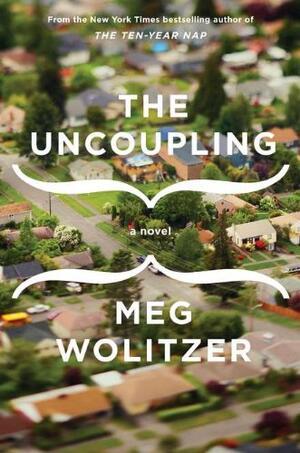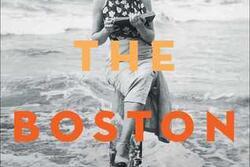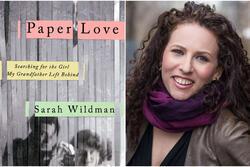Q&A with Meg Wolitzer
Welcome to the JWA Book Club! We are excited to gather today to discuss Meg Wolitzer's best-selling novel, The Uncoupling.
When taking part in our comment-based discussion below, remember to hit "Show Reply" and "Show New Comments" to see the full conversation! Meg Wolitzer will be responding to questions mainly through the "reply" feature.
Here are some questions to consider before we begin:
1. How does The Uncoupling explore the ramifications of the loss of sexual desire?
2. What characters resonated most with you as a reader?
3. What does Meg Wolitzer express about the midlife sexuality of women?







In reply to <p>I would suggest that we by MiriamEichler
Yes, that's a great point. It's so important to be involved in the world, in other people, in new ideas; it keeps vibrancy.
In reply to <p>Yes, that's a great point. by mebalacy
Hmm. There is a sense that passions get overwhelmed by the day-to-day struggle of everyday life in middle age.
In reply to <p>Hmm. There is a sense that by Tara Metal
Yes. People all have to make a choice how to live--what to emphasize, what to give energy to. I feel this very much in terms of my writing life, and protecting my energies. It extends to most people to issues of politics, sex, friendships,etc.
In reply to <p>I would suggest that we by MiriamEichler
Some would argue those losses are related!
In reply to <p>Some would argue those by Rachel K
Rachel, can you expand on that?
In reply to <p>Rachel, can you expand on by Tara Metal
Meaning that one's sexual life is inter-related to the rest of one's outlook ... if you lose your oomph in one area, you often lose it in another! Put another way: if you're not getting any, the rest of life can seem pretty uninteresting! :-)
In reply to <p>Meaning that one's sexual by Rachel K
I don't necessarily agree, Rachel. One might lose one's longtime sexual partner, but still remain very involved and passionate about other areas in life (like one's career, politics, etc.)
In reply to <p>I don't necessarily agree, by MiriamEichler
Excellent point, Miriam. I agree with you ... that's why I said "some would argue ..."
In reply to <p>Excellent point, Miriam. I by Rachel K
Interesting. I think the "stuck in a rut" aspect feels very resonant to me. Sometimes loosing oomph or momentum in one area makes it impossible to muster energy or see positive developments in other areas. I think there is also something here related to confidence and our responses to feeling less confident. Do we step back and into ourselves or do we search for another way to assert and regain the confidence we once had, to be the people we wanted to be?
In reply to <p>Interesting. I think the by Etta King
Good point, Etta! I wasn't thinking so much of self-confidence, but that may be the crux of the matter.
In reply to <p>Good point, Etta! I wasn by MiriamEichler
Yes, stuck in a rut is something that's hard to write about because it's subtle. But I think it's compelling because it's common, and we don't necessarily understand it.
In reply to <p>Yes, stuck in a rut is by mebalacy
Exactly.
In reply to <p>Some would argue those by Rachel K
Yes, please say more.
In reply to <p>I would suggest that we by MiriamEichler
Miriam, what struck you about the other mid-life losses that came up in the book?
In reply to <p>Miriam, what struck you by Etta King
While Robby is still passionate about his teaching, Dory does not seem as involved with her students.
In reply to <p>While Robby is still by MiriamEichler
That's really true! And she doesn't even realize she's lost that passion unless the loss of sex comes about. She doesn't know she's in a rut because her routine is so solid.
(I haven't quite finished the book yet.) Meg, I'd be interested to know why you put the teenage girls under the cold spell, too.
In reply to <p>(I haven't quite finished by Robin Shtulman
Well, I wanted to show a range of female sexuality. For them it had different qualities to it, of course.
In reply to <p>Well, I wanted to show a by mebalacy
IN some ways, I think Willa's storyline is the most jarring. It seems so unfair to have this relationship taken away from her just as she's coming into her own, though it did ring true to teenage relationships on so many levels
In reply to <p>IN some ways, I think by Tara Metal
I really enjoyed Willa as a character. She was real and interesting - So many high school girls are like her.
In reply to <p>I really enjoyed Willa as by Robin Shtulman
I'm glad you did.
In reply to <p>I'm glad you did.</p> by mebalacy
Apologies for needing to head back to work - Lunchtime's over! Enjoy the discussion!
In reply to <p>Apologies for needing to by Robin Shtulman
Thanks for joining us Robin!
In reply to <p>Well, I wanted to show a by mebalacy
Do you think this would be a good book to assign in a high-school English class (also given that it's set partially in a school)? An interesting, albeit potentially uncomfortable, look at the "range of female sexuality" ahead of them, for young women embarking on their sexual lives ...
In reply to <p>Do you think this would be by Rachel K
I rally don't know... They might not be interested in the middle-aged women aspect. But it could be a groundbreaking thing to do, in which case...
In reply to <p>(I haven't quite finished by Robin Shtulman
I love when authors discuss and illuminate teenage sexuality in fiction. As a kid, it felt safer to me to know it was in a novel. I had the same feeling when I read the first Divergent book as an adult. Teenage sexuality is so caught up in so many different things beyond simple desire, and most teens are so verklempt--reading about it in books gives people language to understand and talk about themselves.
Question for Meg: Have there been any reactions to the sexuality and desire aspect of the book--positive or critical--that surprised you? What are you hoping people take/learn/reflect upon from reading the book?
In reply to <p>Question for Meg: Have by Etta King
The reviews were mostly good, though sometimes readers are made uncomfortable by sexuality in fiction. I wrote a novel called The Position, in which the characters' parents wrote a Joy of Sex kind of book in the 70s, and it's about what happens to the kids when they grow up. I think the discomfort aspect is interesting to explore in a book.
In reply to <p>The reviews were mostly by mebalacy
Ooh, I haven't read that one. I think it is an interesting topic too, though. People are particularly uncomfortable thinking about their parents as sexual beings. Doesn't bother me...I know how I got here. ;-)
I read The Uncoupling at the same time I was rewatching all of Mad Men from the beginning. Anyone here watch Mad Men?? Anyway, sex is often cited as women's only form of power on the show, both implicitly and explicitly.
In reply to <p>I read The Uncoupling at by Tara Metal
This is an outdated concept (thankfully) but it's still an interesting one...
In reply to <p>This is an outdated by Tara Metal
I don't think it is that outdated, honestly. I think if we look at girls being told not to "give away" their virginity and people being labeled as a "tease" it comes out very clearly. What amazes/saddens me is how prevalent (and unspoken) this trend is with girls and teens.
In reply to <p>I don't think it is that by Etta King
that's probably true, and depressing. at least it's not women's ONLY avenue to power, a la Mad Men/Lysistrata
In reply to <p>I read The Uncoupling at by Tara Metal
I watch Mad Men, and it's been interesting to see the women's evolution, particularly Joan. (And Peggy, of course.) And now this season, women's liberation is clearly going to be literally referenced.
In reply to <p>I watch Mad Men, and it's by mebalacy
Yeah! Sunday's episode, with the Joan/Peggy elevator conversation...it seems like they're going to make the feminist movement a thing, right?
In reply to <p>Yeah! Sunday's episode, by Tara Metal
No spoilers, please! ;-)
In reply to <p>I read The Uncoupling at by Tara Metal
I love Mad Men. There was a scene in most recent episode that was so sexually jarring. It was a big hard to imagine what women in the workplace actually went through then - and how they spoke with one another as well.
Posting here so people can see: Were any of the characters difficult to write? I'm not a professional writer, but I am always amazed by authors' abilities to create believable characters. I would love for you to say a bit more about how you get into character development.
In reply to <p>Posting here so people can by Etta King
Meg answered: "It's always challenging to write ANYONE who isn't yourself. I love the challenge, though; to me, fiction is about empathy, and trying to understand how other people think and feel. I find it an essential quality, and this is why I feel that fiction is so crucial in our culture."
Hi, Meg! I loved the "conceit" of the book -- with the Lysistrata as the backdrop. Was the play the direct inspiration for the novel, or did you have the idea for the novel first and then draw in the ancient play?
In reply to <p>Hi, Meg! I loved the by Rachel K
The play came first in my mind; but I had been thinking about female sexuality and desire. So much has been written about it in the press. And it all came together as a way to do it in a novel.
In reply to <p>The play came first in my by mebalacy
Have there been any reactions to the sexuality and desire aspect of the book--positive or critical--that surprised you?
In reply to <p>Hi, Meg! I loved the by Rachel K
I think if I had just written about a group of women who complain about their dwindling sexual feelings it would've felt like a complainy magazine article. it needed a metaphorical aspect to elevate it.
In reply to <p>I think if I had just by mebalacy
This is the furthest thing from a "complainy magazine article"! I love the treatment of female sexuality, esp. as someone in mid-age who has been through the inevitable peaks and valleys (so to speak!).
In reply to <p>This is the furthest thing by Rachel K
Thanks, Rachel!
I'll kick off the discussion with a question about characters: I really loved Dory, but I think Bev was my favorite woman in the book. They were all SO relatable and sympathetic. (except for Fran, maybe). Who was your favorite woman to write about?
In reply to <p>I'll kick off the by Tara Metal
I liked getting into the teenaged head with Willa. But it's hard to choose a favorite..
In reply to <p>I liked getting into the by mebalacy
Were any of the characters difficult to write? I'm not a professional writer, but I am always amazed by authors' abilities to create believable characters. I would love for you to say a bit more about how you get into character development.
In reply to <p>Were any of the characters by Etta King
Etta, can you repost this at the top? I think it's getting buried...
In reply to <p>Were any of the characters by Etta King
It's always challenging to write ANYONE who isn't yourself. I love the challenge, though; to me, fiction is about empathy, and trying to understand how other people think and feel. I find it an essential quality, and this is why I feel that fiction is so crucial in our culture.